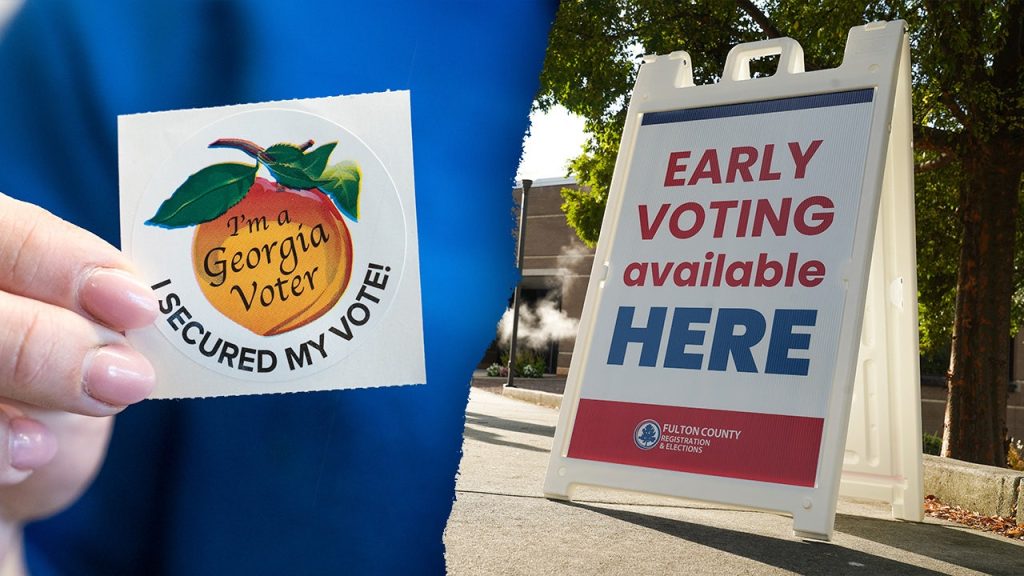Georgia Republicans are threatening to sue Fulton County, a Democratic stronghold, after officials announced extended hours for election offices over the weekend to accommodate voters returning absentee ballots. The state GOP claims this violates Georgia law, as drop boxes are supposed to be closed when the advance voting period ends. Republicans argue that the extended hours in favorable Democratic areas could tip the scales in future elections. Several counties have announced similar plans to keep election offices open this weekend for voters to submit their absentee ballots in person.
The situation in Fulton County has escalated after a judge rejected Republicans’ attempt to force the county to hire more GOP poll workers for Election Day. Accusations were made against the county for not hiring enough Republican poll workers during early voting, leading to a lawsuit threat. While the case is being further reviewed, emergency measures to increase Republican poll workers were not ordered by the judge. With over 439,000 active voters casting early ballots in Fulton County, the demographic breakdown shows a majority of women voters with high turnout among White voters compared to Black voters.
Former President Trump’s loss in Georgia to President Biden by a narrow margin in 2020 has heightened tensions and scrutiny over election procedures in the state. Republicans are pushing back against measures they see as favoring Democrats, such as extended hours for submitting absentee ballots in Democratic-leaning areas. The focus on Fulton County, a key battleground for Democrats in upcoming elections, underscores the strategic importance of electoral processes in determining election outcomes. The threat of legal action by Georgia Republicans highlights ongoing disputes over voting practices and the balance of power in the state.
The decision to keep election offices open over the weekend for absentee ballot submissions has drawn criticism and legal threats from Georgia Republicans. The notion that these extended hours could benefit Democratic candidates has sparked concerns about fairness and potential voter manipulation in future elections. While Fulton County and other counties have defended these measures as legal and necessary to accommodate voters, Republicans argue that the rules on absentee ballots and drop boxes are being circumvented. The dispute reflects broader challenges and controversies surrounding election integrity and partisan interests in the state.
Efforts to challenge election procedures, such as the hiring of poll workers and the handling of absentee ballots, highlight the contentious nature of political competition in Georgia. Republicans’ accusations of bias and potential violations of election laws in Fulton County signal a deeper struggle for control and influence in electoral processes. As Georgia emerges as a key battleground state, the scrutiny and legal threats surrounding voting practices underscore the high stakes and intense partisanship shaping the political landscape. The clash between Republicans and Democrats over election rules and procedures raises questions about the fairness and transparency of the electoral system in Georgia.
Fulton County’s decision to extend hours for turning in absentee ballots and the subsequent legal threats from Georgia Republicans reveal the complex interplay between party politics and electoral processes. With allegations of favoritism, manipulation, and violations of election laws, the tensions in Georgia underscore the challenges of upholding democratic principles amidst partisan divides. As both parties vie for control and influence in key regions like Fulton County, the battle over voting practices reflects broader struggles for power and representation in the state. The outcome of these legal disputes and political confrontations could have far-reaching implications for future elections and the democratic process in Georgia and beyond.
The intensifying conflict between Georgia Republicans and Fulton County officials over extended hours for absentee ballot submissions underscores the larger battle for electoral integrity and fairness in the state. With concerns over potential bias and violations of election laws, the dispute highlights the urgency of addressing voting procedures and regulations to safeguard the democratic process. As Georgia remains a critical battleground state, the outcome of these legal threats and challenges could shape the trajectory of future elections and political outcomes. The need for transparency, accountability, and adherence to election laws is paramount in ensuring a fair and equitable electoral system for all voters in Georgia.


